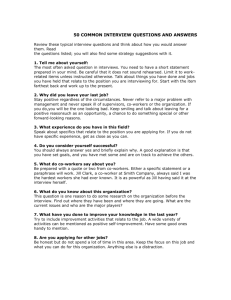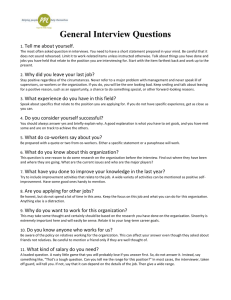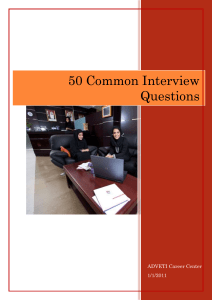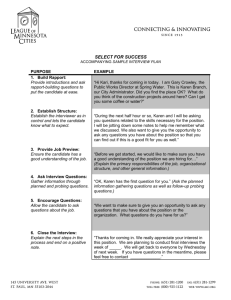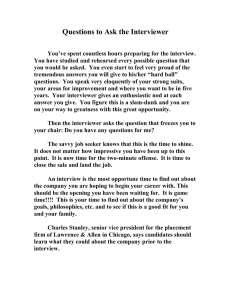general interview questions
advertisement
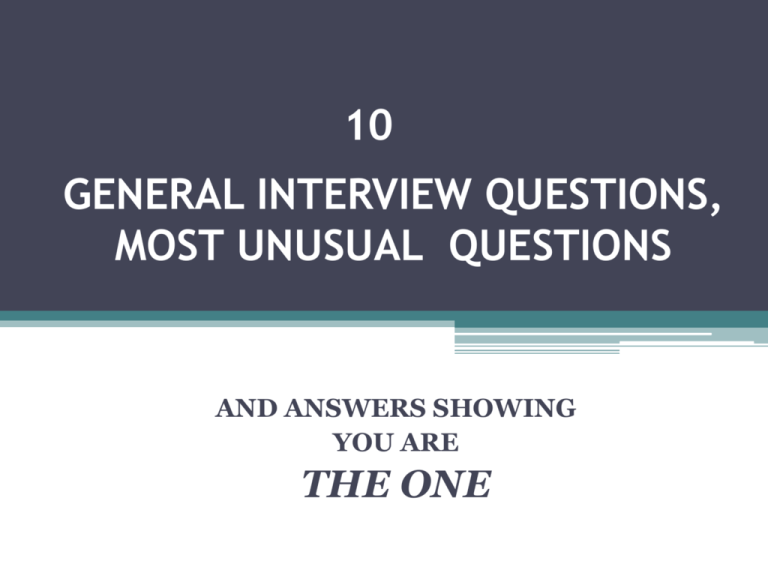
10 GENERAL INTERVIEW QUESTIONS, MOST UNUSUAL QUESTIONS AND ANSWERS SHOWING YOU ARE THE ONE 2 A few tips to begin with: questions start the minute the interview does show that you are an exceptional candidate be prepared to answer not only the typical questions, but also the unexpected expect questions regarding your qualifications, your academic preparation, career interests, experience, and ones that assess your personality. 3 1. Tell me about yourself is the most often asked question in interviews Let’s pretend this is a job intervju; you have a minute to think how to describe yourself. have a short statement prepared in your mind be careful that it does not sound rehearsed limit it to work-related items unless instructed otherwise talk about things you have done and jobs you have held that relate to the position you are interviewing for start with the item farthest back and work up to the present. 4 WEIRD THINGS SAID AT JOB INTERVIEWS Interviewer: Use three adjectives to describe yourself. He said: 'Well, as you can see, I'm a young, virile man and I'm single -- if you ladies know what I'm saying.' Then he looked at one of the fair-haired board members and said, 'I particularly like blondes.' - Petri R.J. Darby, president, Darby Darnit Public Relations "I hate questions like this." - Katrina Meistering, manager of outreach, National Fatherhood Initiative 5 2. Why did you leave your last job? stay positive regardless of the circumstances never refer to a major problem with management and never speak ill of supervisors, co-workers or the organization; if you do, you will be the one looking bad keep smiling and talk about leaving for a positive reason such as an opportunity, a chance to do something special or other forward-looking reasons. WEIRD THINGS SAID AT JOB INTERVIEWS "I was fired from my last job because they were forcing me to attend anger management classes." - Smith 6 3. What experience do you have in this field? speak about specifics that relate to the position you are applying for or if you do not have specific experience, get as close as you can 4. Do you consider yourself successful? always answer yes and briefly explain why; a good explanation, e.g. would be that you have set goals, and you have met some and are on track to achieve the others. 5. What do co-workers say about you? be prepared with a quote or two from co-workers, either a specific statement or a paraphrase will work. 7 6. What do you know about this organization? do some research on the organization before the interview find out where they have been and where they are going, what are the current issues and who are the major players 7. What have you done to improve your knowledge in the last year? try to include improvement activities that relate to the job mention a wide variety of activities as positive selfimprovement have some good ones handy to mention 8 8. Are you applying for other jobs? be honest but do not spend a lot of time in this area keep the focus on this job and what you can do for this organization, anything else is a distraction 9. Why do you want to work for this organization? be careful, this may take some thought and certainly, should be based on the research you have done on the organization sincerity is extremely important here and will easily be sensed relate it to your long-term career goals. Wrong answers: "Just for the benefits." - Jennifer Juergens, JJ Communications "My old boss didn't like me, so one day, I just left and never came back. And here I am!" - Matt Cowall, communications manager, Appia Communications 9 10. Do you know anyone who works for us? be aware of the policy on relatives working for the organization be careful to mention a friend only if they* are well thought of 11. What kind of salary do you need? do not answer it, it’s a loaded question, a nasty little game that you will probably lose if you answer first instead say something like, ”That's a tough question. Can you tell me the range for this position?” In most cases, the interviewer, taken off guard, will tell you. if not say that it can depend on the details of the job and give a wide range. ______________ * remember politically correct language 10 12. Are you a team player? you are, of course, a team player be sure to have examples ready say you often perform for the good of the team rather than for yourself emphasize your team attitude do not brag, just say it in a matter-of-fact tone; this is a key point 13. How long would you expect to work for us if hired? don’t be specific, something like this should work: ”I'd like it to be a long time.” or ”As long as we both feel I'm doing a good job.” 11 14. Have you ever had to fire anyone? How did you feel about that? do not make light of it or in any way seem like you like to fire people, this is serious say you will do it when it is the right thing to do; when it comes to the organization vs. the individual who has created a harmful situation, you will protect the organization remember firing is not the same as layoff or reduction in force. 15. What is your philosophy towards work? don’t offer the interviewer a long or flowery dissertation here express your strong feelings that the job gets done give a short and positive answer which would show a benefit to the organization – that’s the type of answer that works best here 12 16. If you had enough money to retire right now, would you? answer yes if you would say no if you need to work and this is just the type of work you prefer do not say yes if you do not mean it 17. Have you ever been asked to leave a position? say no if you have not say yes if you have be honest, brief and avoid saying negative things about the people or organization involved 13 18. Explain how you would be an asset to this company highlight your best points as they relate to the position being discussed a pun: "Well, I do own a bike." 19. Why should we hire you? point out how your assets meet what the organization needs do not mention any other candidates to make a comparison an honest answer:"I would be a great asset to the events team because I party all the time." - Bill McGowan, founder, Clarity Media Group 20. Tell me about a suggestion you have made have a good one ready be sure and use a suggestion that was accepted and was then considered successful 14 21. What irritates you about co-workers? be careful, this is a trap question. think real hard but fail to come up with anything that irritates you, a short statement that you seem to get along with folks is great 22. What is your greatest strength? just stay positive, numerous answers are good, e.g. your ability to prioritize, your problem-solving skills, your ability to work under pressure your ability to focus on projects your professional expertise your leadership skills your positive attitude 15 23. Tell me about your dream job stay away from a specific job, you cannot win; if you say the job you are contending* for is it, you strain** credibility; if you say another job is it, you plant the suspicion that you will be dissatisfied with this position if hired say something like: ”A job where I love the work, like the people, can contribute and can't wait to get to work.” 24. Why do you think you would do well at this job? give several reasons and include skills, experience and interest 25. What are you looking for in a job? see answers 23 ___________ * compete ** undermine, lack 16 26. What kind of person would you refuse to work with? mention disloyalty to the organization, violence or lawbreaking minor objections will label you as a whiner 27. What is more important to you: the money or the work? money is always important, but the work is the most important, there is no better answer 17 28. What would your previous supervisor say your strongest point is? pick some of these: loyalty, energy, positive attitude, leadership, team player, expertise, initiative, patience, hard work, creativity, problem solver 29. Tell me about a problem you had with a supervisor be careful, this is the biggest trap of all, this is a test to see if you will speak ill of your boss don’t fall for it, stay positive and develop a poor memory about any trouble with a supervisor 18 31. Tell me about your ability to work under pressure say that you thrive* under certain types of pressure give an example that relates to the type of position applied for 32. Do your skills match this job? say yes, do not give fuel to the suspicion that you may want another job more than this one 33. What motivates you to do your best on the job? personal traits like challenge, achievement, recognition 34. Are you willing to work overtime? Nights, weekends? this is up to you but be totally honest ___________ * become and continue to be successful and strong 19 35. How would you know you were successful on this job? several ways are good measures, such as: You set high standards for yourself and meet them. Your outcomes are a success. Your boss tells you that you are successful. 36. Would you be willing to relocate if required? be clear on this with your family prior to the interview if you think there is a chance it may come up do not say yes just to get the job if the real answer is no, this can create a lot of problems later on in your career be honest at this point and save yourself future grief 20 37. Are you willing to put the interests of the organization ahead of your own? do not worry about the deep ethical and philosophical implications. just say yes, this is a straight loyalty and dedication question 38. Describe your management style try to avoid labels, like progressive, salesman or consensus, they can have several meanings or descriptions depending on which management expert you listen to the situational style is safe, because it says you will manage according to the situation 21 39. What have you learned from mistakes on the job? come up with something or you strain credibility, make it small, well intentioned mistake with a positive lesson learned an example would be working too far ahead of colleagues on a project and thus throwing coordination off 40. Do you have any blind spots*? trick question, if you know about blind spots, they are no longer blind spots do not reveal any personal areas of concern here let them do their own discovery on your bad points do not hand it to them _________________ * something you ignore or are unwilling or unable to understand 22 41. If you were hiring a person for this job, what would you look for? be careful to mention traits that are needed and that you have 42. Do you think you are overqualified for this position? state that you are very well qualified for the position, regardless of your qualifications 43. How do you propose to compensate for your lack of experience? first, if you have experience that the interviewer does not know about, bring that up then, point out (if true) that you are a hard working quick learner 23 44. What qualities do you look for in a boss? be positive, mention the safe ones such as knowledgeable, a sense of humor, fair, loyal to subordinates and holder of high standards don’t forget that all bosses think they have these traits 45. Tell me about a time when you helped resolve a dispute between others pick a specific incident, concentrate on your problem solving technique and not the dispute you settled 46. What position do you prefer on a team working on a project? be honest, if you are comfortable in different roles, point that out 24 47. Describe your work ethic emphasize benefits to the organization like, determination to get the job done, work hard, enjoy your work 48. What has been your biggest professional disappointment? be sure that you refer to something that was beyond your control show acceptance and no negative feelings 49. Tell me about the most fun you have had on the job talk about having fun by accomplishing something for the organization 25 50. Do you have any questions for me? always have some questions prepared, e.g. where you will be an asset to the organization, how soon you will be able to be productive, or what type of projects you will be able to assist on THANK YOU VERY MUCH FOR YOUR ATTENTION! and now some true stuff… 26 The employers were also asked to list the "most unusual" questions that have been asked by job candidates. "What is it that you people do at this company?" "What is the company motto?" "Why aren't you in a more interesting business?" "What are the zodiac signs of all the board members?" "Why do you want references?" "Do I have to dress for the next interview?" "I know this is off the subject, but will you marry me?" 27 "Will the company move my rock collection from California to Maryland?" "Will the company pay to relocate my horse?" "Does your health insurance cover pets?" "Would it be a problem if I'm angry most of the time?" "Does your company have a policy regarding concealed weapons?" "Do you think the company would be willing to lower my pay?" "Why am I here?" 28 More questions that have been asked by job candidates "If you were a fruit, what fruit would you be?" - Megan Garnett, Articulate Leadership Team, Articulate Communications Inc. "What do you want me to do if I cannot walk to work if it's raining? Can you pick me up?" - Christine Pechstein, career coach. "I was a Chamber of Commerce Executive once hiring a secretary. [The candidate asked] 'What does a Chamber of Commerce do?'" - Mary Kurek, Inc. Visibility Consulting. "What is your company's policy on Monday absences?" – Campbell. 29 "If this doesn't work out can I call you to go out sometime?" Christine Bolzan, founder of Graduate Career Coaching. "How big do the bonuses really get once you make associate? I hear it's some serious cash." – Bolzan. "If I get an offer, how long do I have before I have to take the drug test?" – Bolzan. "When you do background checks on candidates, do things like public drunkenness arrests come up?" – Bolzan. "So, how much do they pay you for doing these interviews?" -Jodi R.R. Smith, Mannersmith Etiquette Consulting. 30 Vice Presidents and personnel directors of the one hundred largest corporations were asked to describe their most unusual experience interviewing prospective employees. A job applicant challenged the interviewer to an arm wrestle. Interviewee wore a Walkman, explaining that she could listen to the interviewer and the music at the same time. Candidate fell and broke arm during interview. Candidate announced she hadn't had lunch and proceeded to eat a hamburger and French fries in the interviewer’s office. Candidate explained that her long-term goal was to replace the interviewer. 31 Candidate said he never finished high school because he was kidnapped and kept in a closet in Mexico. Balding Candidate excused himself and returned to the office a few minutes later wearing a headpiece. Applicant said if he was hired he would demonstrate his loyalty by having the corporate logo tattooed on his forearm. Applicant interrupted interview to phone her therapist for advice on how to answer specific interview questions. Candidate brought large dog to interview. Candidate dozed off during interview. I hope you haven’t dozed off during this presentation! THANK YOU FOR YOUR ATTENTION.
